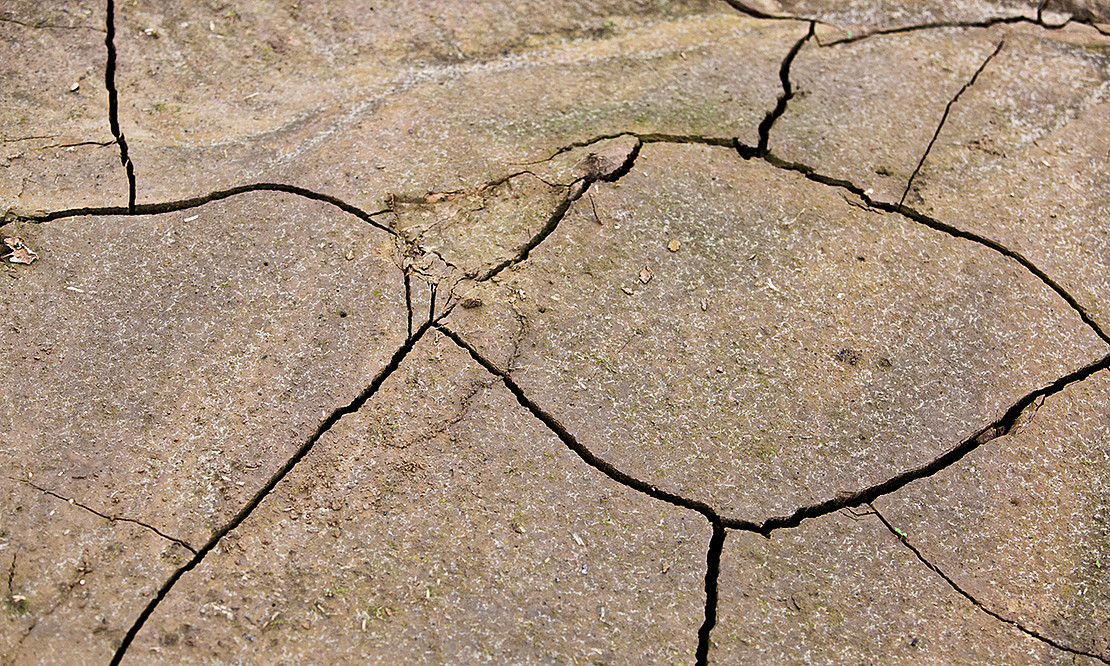This page contains automatically translated content.
Climate change affects soil health
 Image: University of Kassel / Sonja Rode
Image: University of Kassel / Sonja RodeClimate change is affecting the health of agricultural soils. An increase in heat and drought makes it easy for the pathogenic fungus Pythium ultimum to take hold. As shown by an international team of researchers led by the Universities of Kassel and Bonn, the fungus causes almost total crop failure in peas after a hot and dry stress event. A short-term soil recovery seems to succeed only exceptionally. The study has now been published in the journal "Applied Soil Ecology".
Pythium ultimum is an aggressive fungus that is transmitted through the soil and attacks the roots in the juvenile stage of important agricultural crops such as beets, peas, but also corn, soybeans and potatoes. The plants develop root rot and die. "In some cases, total failure of the germinating young plants can occur," notes Dr. Christian Bruns of the Ecological Agriculture and Plant Production Department at the University of Kassel. However, soils also have protective mechanisms against these pathogens. Like "bodyguards," certain fungi can protect the roots of the plants, and some microorganisms parasitize the harmful fungus or simply eat it.
The scientists took soil samples from very different locations in cool, humid Scotland, temperate northeastern Germany and dry, warm eastern Hungary. The soil samples, along with the microorganisms living in them, were then stressed in climate chambers with heat (40 degrees Celsius) and drought (only half the soil moisture) and then infected with the aggressive fungus Pythium ultimum. The researchers investigated the effects of this stress event on the pathogen and ultimately on the plants by subsequently sowing peas in these pretreated soils.
Dramatic effect: Hardly any pea plants survived
The effect was dramatic: "Only a few of the young pea plants survived and those that did stunted under the fungal attack," summarizes Prof. Dr. Thomas Döring from the Department of Agroecology and Organic Agriculture at the University of Bonn. In all soils, the stress event of heat and drought led to a strong reduction in resistance to Pythium ultimum. Soils from Scotland suffered the most, those from Hungary the least. "Apparently, the protective microorganisms in the soils of cool-humid Scotland are less adapted to heat and drought than in Hungarian soils, which are often exposed to high temperatures and droughts in summer," Döring surmises.
The scientists studied how well different soils can recover by taking a break of several weeks after treating them with heat and drought before infecting the topsoil with the harmful fungus and sowing the peas. While a soil sample from Scotland showed some recovery by growing slightly more peas on it in comparison, the samples from Hungary seemed more likely to have the harmful effects of the fungus worsened by the recovery period.
"What seems to be crucial is how quickly the protective microorganisms can reproduce after the stress event," Bruns says, referring to the results of other studies. "This ability is apparently not as pronounced in the soil samples from Hungary." Soils that have a high resistance to drought and heat, therefore, do not seem to have as good a recovery ability.
With heat and drought, susceptibility to soil bacteria increases
All of this suggests that as the climate warms more in temperate and northern latitudes, soil microorganisms will not be able to adapt to it as quickly. "Heat and drought negatively affect the resistance of soils," Döring says. "This increases the susceptibility of plants to soil-borne pathogens," adds Bruns. In light of ongoing climate change, this could significantly increase the risk of plant diseases and crop failures. However, more research is needed, he adds.
Publication: Thomas F. Döring, Dagmar Rosslenbroich, Christian Giese, Miriam Athmann, Christine Watson, Imre Vágó, János Kátai, Magdolna Tállai, Christian Bruns: Disease suppressive soils vary in resilience to stress, "Applied Soil Ecology", DOI: https: //doi.org/10.1016/j.apsoil.2019.103482
Contact:
Dr. Christian Bruns
Ecological Agriculture and Plant Production
University of Kassel
Tel. 05542/981543
Email: ch.bruns[at]uni-kassel[dot]de
Prof. Dr. Thomas Döring
Agroecology and Organic Farming
University of Bonn
Tel. 0228/735135
E-mail: tdoering[at]uni-bonn[dot]de